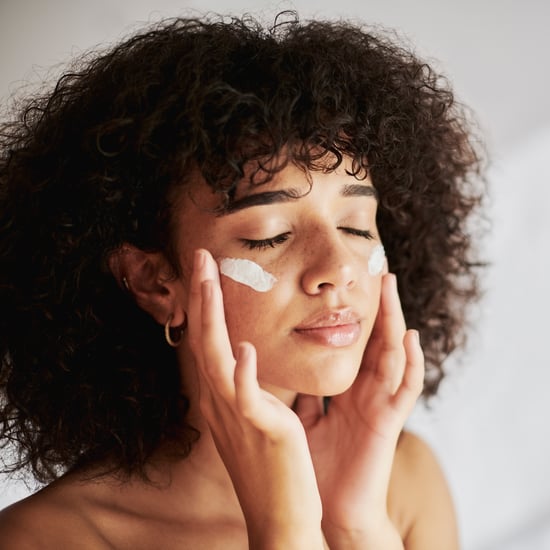Dry January Benefits, According to Doctors
Thinking of Trying Dry January? Here Are the Benefits, According to Doctors

Dry January has become a popular tradition for many in the past few years. In fact, 6.5million British adults participated in the trend in 2021, according to Alcohol Change. People cut out alcohol for the month for a number of reasons and with various results, like improved sleep and more energy.
Worth noting: If you're a heavy drinker and think you may have an alcohol dependency and want to cut back, you should talk to your doctor first, or seek out the support services listed at the end of this article. If you stop drinking abruptly, you may go through alcohol withdrawal. "Alcohol dependence is a chronic medical condition where excessive alcohol is ingested due to an urge and inability to stop," Flora Sinha, MD, board-certified internal medicine physician, told POPSUGAR. "These patients will experience withdrawal symptoms like shakes, diarrhea, chills, and sweats if they stop suddenly." People who are light to moderate drinkers would likely not experience withdrawal symptoms, and this article is geared toward them.
For instance, one of our former editors who wanted to give alcohol a break gave Dry January a try and concluded that she had more energy, ate better, and saved a good amount of money. But is there actually any science behind the trend? We spoke to a handful of experts about what cutting out alcohol might do for mental and physical health. Here are a few benefits they highlighted.
Dry January Benefits: Weight Loss and Changed Appetite
The aforementioned editor who tried Dry January did lose weight when she eliminated alcohol. "The easiest way to lose weight is to cut out 'liquid calories' that have minimal nutritional value. That's alcohol for a lot of people," Dr. Sinha said. Alcohol can have a negative impact on the metabolism by interfering with your liver's ability to process fat.
You may notice that you feel less hungry if you take alcohol out of the equation. Dr. Sinha noted there are studies that suggest alcohol can increase hormones in the brain that regulate appetite. She said it's important to know, though, that heavy drinkers (or those who abuse alcohol) have decreased appetite "because they, at that point, are getting the majority of their calories from alcohol."
Dry January Benefits: Improved Sleep
"At the beginning of the night, alcohol has a sedative effect, so most people will notice they can fall asleep easier or even 'pass out,'" Meredith Broderick, MD, a triple-board-certified sleep doctor and neurologist, told POPSUGAR. "But once the alcohol wears off, there is a surge of the sympathetic nervous system, causing an early-morning awakening or several awakenings in the second part of the night."
Alcohol also "causes the airway to collapse easier, so people may notice snoring, waking up gasping for air, or even a swollen uvula," Dr. Broderick said. Overall, she noted, it disrupts the quality of sleep. Participating in something like Dry January, then, can impact someone's slumber in a positive way.
Dry January Benefits: Better Skin
Samantha Ellis, MD, a board-certified dermatologist and clinical instructor of dermatology at UC Davis, told POPSUGAR that drinking conservative amounts of alcohol doesn't necessarily lead to worsened skin health or appearance in those without underlying skin conditions (though we do know that alcohol can dehydrate your skin). She noted, too, that drinking in excess "can take a toll on multiple organ systems, including the skin. This can lead to a sallow skin appearance, dilated and broken blood vessels on the skin's surface, and worsening of chronic cutaneous diseases like psoriasis, eczema, and rosacea."
Cutting out alcohol may also result in skin benefits in other ways, Dr. Ellis said. "We know those who consume alcohol can make poor dietary choices and have disrupted sleep, both of which negatively influence skin appearance," she explained. "Without the sedating effect of alcohol, individuals may also feel more motivated to participate in healthy skin-care habits like removing makeup before bedtime, performing a restorative skin-care routine, and exercising regularly."
Dry January Benefits: Improved Mental Health
Dr. Harrison said that alcohol in moderation is perfectly fine for your mental health and, in some studies, even is correlated with an increase in happiness. However, once drinking goes beyond moderation, it's associated with anxiety, depression, decreased energy, irritability, and difficulty concentrating among other things. This can impact a person's relationships and life responsibilities, she said, which in turn can make mental health suffer even more.
"Many people believe only 'severe alcoholics' experience this cycle," Dr. Harrison stated. In reality, though, one in six American adults binge drinks about four times a month. "By cutting alcohol from your diet, you will see an improvement in mood; anxiety; concentration; sleep; relationships; and, often, self-esteem," she said.
What Are the Longer-Term Benefits of Cutting Out Alcohol?
Dr. Sinha said that cutting out alcohol could benefit the liver within weeks — that's if you're someone who does not already have liver problems. Looking at the long term, eliminating alcohol can decrease liver damage and prevent alcoholic hepatitis or fatty liver disease (though people can get fatty liver disease without alcohol consumption). Eliminating alcohol for an extended period of time may also lower your long-term risk of cancer and cardiovascular disease, Dr. Sinha added.
What Happens After Dry January?
Dr. Sinha said that if you want to go back to drinking alcohol after Dry January, stick to moderate drinking. For healthy adults, this generally means no more than 14 unites in a week, according to Drink Aware. A standard drink looks like:
- Pint of Beer: 3 units
- 175 ml Wine: 2.3 units
- Spirit shot: 1 unit
—Additional reporting by Alexis Jones
If you or a loved one is experiencing signs of addiction or alcohol dependence, the Alcoholics Anonymous National Helpline is a free and confidential service you can call for information and treatment referral on 0800 9177650. Plus, find other resources at Alcoholics Anonymous.






